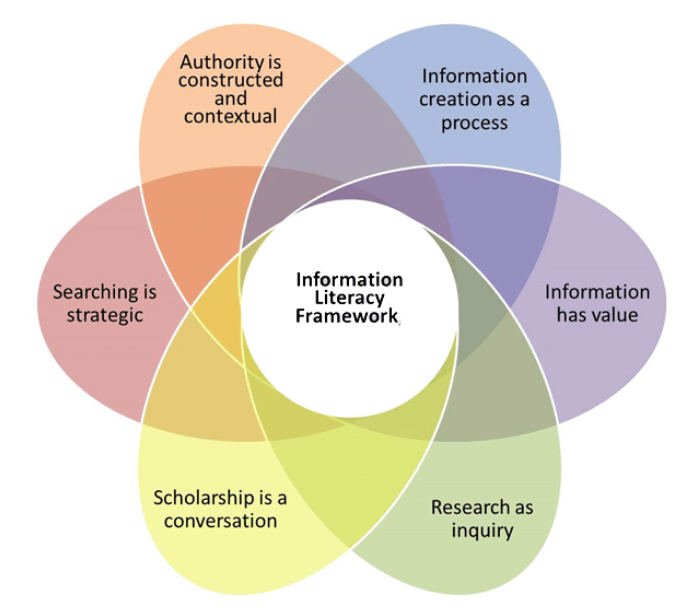Scholarship as conversation, one of the six frameworks for information literacy adopted by the Association of College and Research Libraries (ACRL) Board in 2016. Since then, these six frames have been the focus of information literacy instruction in academic libraries.
At its core, scholarship as conversation attempts to teach students that communities of scholars, researchers, and professionals engage in sustained discourse with new insights and discoveries occurring over time as a result of varied perspectives and interpretations (ACRL Framework).

For those who have spent time working in academic institutions, this might be obvious. However, students coming into higher education for the first time, might not have this insight. Scholarship as conversation is a very advanced concept and students need to learn how to enter the conversation.
If you read my last post, you’ll know that I am interested in conversations. They make library instruction authentic and memorable. They can also be difficult to begin and sustain.
Inserting yourself in the conversation is difficult
Like many people who attend conferences, I try to get to as many social activities as possible. It’s nice to connect and network with new colleagues who share similar interests. These events almost always lead to people talking about work and what they do at their jobs. This is one of the greatest learning opportunities for people to join a conversation. It requires listening and reflection. To be good at networking requires people to make connections quickly. Bridging your own experience into a colleague’s conversation is a great way to build strong relationships and create authenticity.
While completing my Library and Information Technician diploma, we would often participate in networking events. Sometimes, I would hear other students lead with questions such as “are you hiring?” This would always make me cringe. Instead, “what do you do?” was always a safe and preferred introduction.

Usually, they would start talking about their careers and current work projects. While they spoke, I would be searching my library brain for connections to my own interests or work. “That’s interesting, that makes me think of…” or “Is that related to?”
When you ask a question, make it sincere and of genuine interest. When I was a student, I was not an expert in libraries. The value of networking is to learn and gain understanding. I applied what I knew to what experts were saying and inserted myself into a conversation.
In order to participate, I had to listen. I had to metaphorically walk before I could run.
The Burkean Parlor
At the last Ontario Library Association Super Conference, I attended in person, I sat in on a session where the presenter mentioned a theory by Kenneth Burke called the Burkean Parlor. In his theory, Burke argues…
Imagine that you enter a parlor. You come late. When you arrive, others have long preceded you, and they are engaged in a heated discussion, a discussion too heated for them to pause and tell you exactly what it is about. In fact, the discussion had already begun long before any of them got there so that no one present is qualified to retrace for you all the steps that had gone before. You listen for a while until you decide that you have caught the tenor of the argument; then you put in your oar. Someone answers; you answer him; another comes to your defense; another aligns himself against you, to either the embarrassment or gratification of your opponent, depending upon the quality of your ally’s assistance. However, the discussion is interminable. The hour grows late, you must depart. And you do depart, with the discussion still vigorously in progress.
(Kenneth Burke, The Philosophy of Literary Form: Studies in Symbolic Action 3rd ed. 1941. Univ. of California Press, 1973)
The Burkean Parlor theory piqued my interest. It made me reflect on the ACRL frame “scholarship as conversation” in a new way.
The parlor, conversations and students
In my experience teaching first-year university students, library professionals try to make students expert researchers. It makes me think of my previous post where the student said academic writing is boring. In most cases, we shouldn’t expect first-year students to understand the concepts discussed in academic writing. These papers are written BY academics FOR other academics. To return to Burke’s Parlor, this is the conversation that has been going on long before students read the paper.
First-year students should recognize that the “conversations” happening in academia has been going on for decades or even centuries. They are joining a conversation that is impossible to have the expertise to join (at least in their first year). The Burkean Parlor metaphor perfectly articulates student involvement in the scholarly conversation happening in higher education.
I recently read an interesting paper by Daniel Pfeiffer titled, Dining with Anna Karenina: Opening the invitation to Burke’s Parlor. In their paper, Pfeiffer discusses the problems with Burke’s Parlor and argues that it is not accessible for new academics (and students). The contents of Pfeiffer’s paper are too large to unpack here, needless to say, it’s thought-provoking and provides an excellent insight into students’ ability to access “the parlor”.
Conversations are never ending
If you are a librarian or information specialist, I encourage you to look at Burke’s Parlor. It has changed the way I look at the ACRL frame “Scholarship as Conversation”. It allows me to unpack a complex idea into something much more tangible. Have you heard of Burke’s Parlor? If so, how have you used it to frame information literacy instruction?

